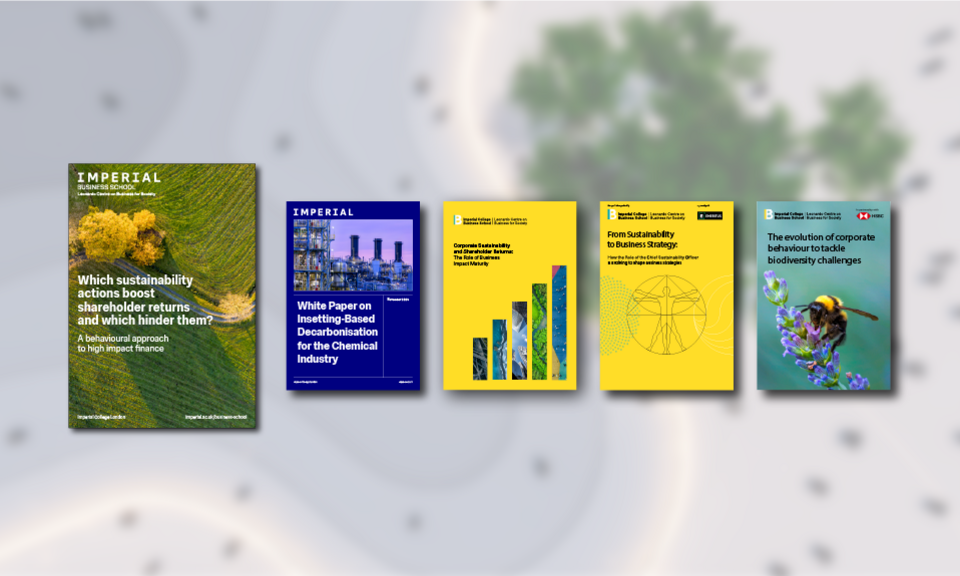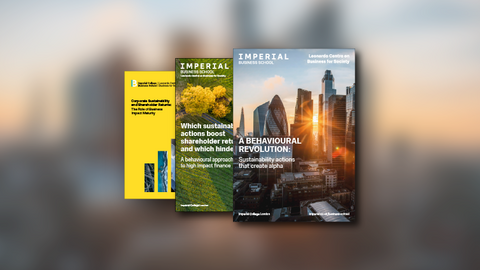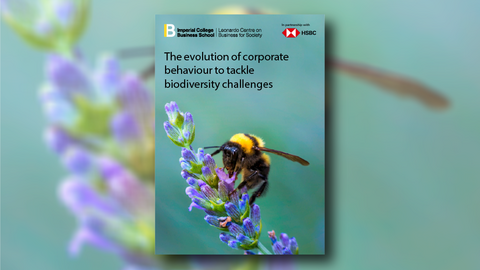
Discover how our research translates into transformative action.
Published Papers
Authors: Simone Cenci, Hossein Asgharian, Lu Liu, Marek Rei, Maurizio Zollo
Journal: Journal of Cleaner Production
Highlights
- We examine companies’ responses to competitive pressure.
- Competitive pressure is associated with diversification of environmental investments.
- Diversified investments are associated with greater emission abatement potential.
- Competitive pressure can be a driving force of effective mitigation actions.
Authors: S. Cenci, Matteo Burato, Marek Rei, and Maurizio Zollo.
Journal: Nature Communications
Abstract: In this paper, we provide a systematic characterisation of corporate sustainability behaviour over the last ten years, and an analysis of the sustainability strategies of companies with carbon emissions aligned with the climate targets set out by the Paris Agreement.
Journal: Proceedings of the National Academy of Sciences USA (PNAS)
Abstract: System thinking is a crucial cognitive framework to enable individual pro-environmental behavioral changes. Indeed, a large body of literature has shown a significant and positive association between individuals’ system thinking capacities and perceptions of the threat posed by climate change. However, individual behavioral changes play a limited role in addressing climate change compared to large organizations involved in a significantly larger share of economic activities. Do organizations exhibit system thinking capacities? Here, we conjecture that system thinking is a cognitive framework observable at an aggregated group level and, therefore, organizations, not just individuals, can exhibit characteristic levels of system thinking. We conceptualize a definition of organizational system thinking and develop an empirical method to estimate it using a large body of textual data from business organizations. Then, we show that system thinking organizations are more likely to lower emissions and align them with the pathways required to meet the climate targets set by the Paris Agreement. Finally, we discussed the theoretical and policy implication of our study. Overall, our results suggest that system thinking is a relevant organization-level cognitive framework that can help organizations align their emissions with global climate targets.
Author: S.Cenci.
Journal: Journal of Sustainable Finance & Investment
Abstract: To allocate capital to its most sustainable use, market participants need information on companies' sustainability plans and initiatives. This information is disclosed in sustainability reports, but the disclosure process is largely unregulated and voluntary. When do sustainability reports convey relevant information? To answer this question we estimate the heterogeneous effects of nonfinancial disclosure on analysts' estimates of earnings and firms' equity values. We have found that the information content of nonfinancial disclosure is larger when firms are subject to greater information asymmetry, and when nonfinancial information is integrated within a financial context. Moreover, positive responses have a long-lasting impact while negative shocks are corrected within a short window. Overall, our work suggests that market participants' interest in standalone nonfinancial information is limited, and integrated reporting increases the value of sustainability reports.
Authors: Emanuele Bettinazzi, Maurizio Zollo
Journal: Strategic Management Journal
In this article, we study how a firm's stakeholder orientation affects the performance of its corporate acquisitions. We depart from prior literature and suggest that orientations toward employees, customers, suppliers, and local communities will affect long‐term acquisition performance both directly and through its interactions with process characteristics, such as pre-acquisition relatedness and post-acquisition integration. Analyses of data on a sample of 1884 acquisitions show overall a positive association between acquirers' stakeholder orientation and acquisition performance. In addition, we find support for a positive moderation of business relatedness on the performance impacts of stakeholder orientation. Structural integration has a similarly positive moderation effect only for some of the stakeholder categories.
Authors: Maurizio Zollo, Mario Minoja, Vittorio Coda
Journal: Strategic Management Journal
We develop an integrative approach to the study of strategic management in a four‐step logical sequence. First, we discuss one of the rare conceptual frameworks of integrated firm strategy introduced by Coda (1984). Second, we focus on competitive, growth, and stakeholder strategies and identify four integrative mechanisms underlying the creation of joint outcomes from the combination of different strategic choices. Third, we study how these mechanisms might allow specific binary combinations of strategic choices to create higher levels of value for stakeholders. Lastly, we study the likelihood of alternative three‐way bundles of strategies to generate the highest expected value. This analysis identifies two bundles of strategic decisions that can potentially maximize performance outcomes.
Author: Christine A. Hemingway
Book Series: Research in Ethical Issues in Organisations, Volume 21
The approach comprises two main points. First, it is argued that corporate social responsibility (CSR) develops within organisations, over time, in four general phases. Also, that practitioner attitudes are moving away from the dominant phase of social responsibility as public relations activity (Hemingway, 2013). The financial crash of 2008 was the catalyst for this marked gear shift in the awareness of organisational ‘ethics’ and ‘morality’ (SR) that was previously confined to the concerns of the business ethics scholars. Second, that, in general, the legitimacy and credibility of SR in business schools has been lagging behind that shift; due to misunderstandings about its relevance, the obsession with performance metrics and a lack of political will in some cases. Ways forward are suggested for research, teaching and practice.
Author: Hemingway, C.A. and Starkey, K.
Journal: The Journal of Business Ethics
This article uses the life stories approach to leadership and leadership development. Using exploratory, qualitative data from a Forbes Global 2000 and FTSE 100 company, we discuss the role of the turning point (TP) as an important antecedent of leadership in corporate social responsibility. We argue that TPs are causally efficacious, linking them to the development of life narratives concerned with an evolving sense of personal identity. Using both a multi-disciplinary perspective and a multi-level focus on CSR leadership, we identify four narrative cases.
We propose that they helped to re-define individuals’ sense of self and in some extreme cases completely transformed their self-identity as leaders of CSR. Hence, we also distinguish the momentous turning point (MTP) that created a seismic shift in personality, through re-evaluation of the individuals’ personal values. We argue that whilst TPs are developmental experiences that can produce responsible leadership, the MTP changes the individuals’ personal priorities in life to produce responsible leadership that perhaps did not exist previously. Thus, we appropriate Maslow’s metaphorical phrase ‘A falling of the veils’ from his discussion of peak and desolation experiences that produce personal growth. Using a multi-disciplinary literature from social theory, moral psychology and social psychology, we present a theoretical model that illustrates the psychological process of the (M)TP, thus contributing to the growing literature on the micro-foundations of CSR.
Authors: Higgins, C., Tang, S., & Stubbs, W. Article in press.
Journal: Journal of Business Research
Hypocrisy creates significant challenges for managers and stakeholders. Knowledge of its nature and causes is extensive; however, understandings of its implications for management practice are limited. This study draws on the transparency literature, notably Schnackenberg and Tomlinson's (2016) disclosure, clarity and accuracy framework, to show that the way in which information is presented affects the way hypocrisy manifests and how it can be addressed. We analysed the sustainability reports of three financial services companies in Australia over a five-year period and found that in addition to minimising duplicity, transparency can increase engagement with the competing expectations facing companies. Despite its limitations, sustainability reporting offers insights in to the nature, causes and implications of organisational hypocrisy.
Authors: Brusoni S., Laureiro D., Tata A., Zollo M.
Journal: Journal of Management Studies (2019)
This study builds upon March and Simon’s proposition that individual‐level differences must be considered when explaining decision‐making performance. We extend their discussion on the importance of decision‐makers’ attention to explain heterogeneous patterns of exploration and exploitation within the same uncertain environment. We develop a model of decision‐making under uncertainty in which ‘working memory’ – i.e., the ability to hold multiple elements in mind to actively process them – explains the emergence of heterogeneity in exploration‐exploitation choice patterns. We validated the model in a laboratory study and two replications involving 171 individuals. Our findings show that differences in working memory allow us to identify individuals who are more likely to choose exploration over exploitation appropriately, and thus achieve higher performance. We discuss the implications for management theories, and re‐propose the work of March and Simon as a unifying framework that still can be used to generate and test managerially relevant hypotheses.
Authors: Cambrea, D.R., Tenuta, P., and Vastola, V.
Journal: Management Decision, published online (2019)
The purpose of this paper is to investigate the impact of gender diversity on corporate cash holdings by scrutinizing different positions covered by female board directors.
Authors: Dodich A, Zollo M, Crespi C, Cappa SF, Laureiro Martinez D, Falini A, Canessa N. et al.
Journal: Brain and Behavior, Vol: 9, ISSN: 2162-3279 (2019)
While cross‐sectional studies have shown neural changes in long‐term meditators, they might be confounded by self‐selection and potential baseline differences between meditators and non meditators. Prospective longitudinal studies of the effects of meditation in naïve subjects are more conclusive with respect to causal inferences, but related evidence is so far limited.
Here, we assessed the effects of a 4‐week Sahaja Yoga meditation training on gray matter density and spontaneous resting‐state brain activity in a group of 12 meditation‐naïve healthy adults.
Compared with 30 control subjects, the participants to meditation training showed increased gray matter density and changes in the coherence of intrinsic brain activity in two adjacent regions of the right inferior frontal gyrus encompassing the anterior component of the executive control network. Both these measures correlated with self‐reported well‐being scores in the meditation group.
The significant impact of a brief meditation training on brain regions associated with attention, self‐control, and self‐awareness may reflect the engagement of cognitive control skills in searching for a state of mental silence, a distinctive feature of Sahaja Yoga meditation. The manifold implications of these findings involve both managerial and rehabilitative settings concerned with well‐being and emotional state in normal and pathological conditions.
Authors: Bammer, Gabriele, O’Rourke, Michael, Burgman, Mark et al
Journal: Nature
Expertise in research integration and implementation is an essential but often overlooked component of tackling complex societal and environmental problems. We focus on expertise relevant to any complex problem, especially contributory expertise, divided into ‘knowing-that’ and ‘knowing-how.’ We also deal with interactional expertise and the fact that much expertise is tacit. We explore three questions. First, in examining ‘when is expertise in research integration and implementation required?,’ we review tasks essential (a) to developing more comprehensive understandings of complex problems, plus possible ways to address them, and (b) for supporting implementation of those understandings into government policy, community practice, business and social innovation, or other initiatives. Second, in considering ‘where can expertise in research integration and implementation currently be found?,’ we describe three realms: (a) specific approaches, including interdisciplinarity, transdisciplinarity, systems thinking and sustainability science; (b) case-based experience that is independent of these specific approaches; and (c) research examining elements of integration and implementation, specifically considering unknowns and fostering innovation. We highlight examples of expertise in each realm and demonstrate how fragmentation currently precludes clear identification of research integration and implementation expertise. Third, in exploring ‘what is required to strengthen expertise in research integration and implementation?,’ we propose building a knowledge bank. We delve into three key challenges: compiling existing expertise, indexing and organising the expertise to make it widely accessible, and understanding and overcoming the core reasons for the existing fragmentation. A growing knowledge bank of expertise in research integration and implementation on the one hand, and accumulating success in addressing complex societal and environmental problems on the other, will form a virtuous cycle so that each strengthens the other. Building a coalition of researchers and institutions will ensure this expertise and its application are valued and sustained.
Authors: Arndt, Burgman et al
Journal: Conservation Research, Policy and Practice
We discuss the factors influencing the relationship between government policy-makers and scientists and how they affect the use of science in policy. We highlight issues related to context, values, culture, timeframes, communication and interpersonal relationships, providing insights from policy-makers and scientists. A spectrum of working strategies is given with examples of practical mechanisms that improve the effective use of science in policy. The shared governance model is a relatively mature approach with the potential to overcome many of the barriers discussed. At its core, shared governance, or co-production, invites policy-makers and scientists to develop and manage research priorities collaboratively. We explore the primary features of a successful shared governance arrangement, exemplified by the collaborative working model between the Australian Government Department of Agriculture and the Centre of Excellence for Biosecurity Risk Analysis. We conclude by outlining the advantages and disadvantages of the co-production of research priorities by scientists and policy-makers and present the learnings from its implementation in the biosecurity sector in Australia.
Authors: Vuori, N., Laamanen, T., Zollo, M.
Journal: Journal of Management Studies (2023)
Abstract: We investigated the role of heuristics in decision-making in infrequent and heterogeneous organizational processes. In our multiple-case study, we tracked individual managers' knowledge, how managers collectively articulated and codified knowledge, and how they used it in mergers and acquisitions (M&A) decision-making. We developed a process model that explains (a) the evolution and the interplay between heuristics and causal knowledge and (b) the implications of these processes for decision-making. More precisely, we found that some managers possessed and used rough heuristics – heuristics developed via limited or non-existent firsthand experience. Because rough heuristics were often faulty, they led to errors if used in a different context. In contrast, other managers possessed and used causal knowledge – knowledge explaining causal regularities in the environment. Causal knowledge was associated with higher quality decision-making and better performance in subsequent acquisitions. The problem that our focal companies faced was that causal knowledge often evaporated during attempts at collective articulation and codification, causing the conversion of causal knowledge into rough heuristics. We contribute to the organizational heuristics literature by improving our understanding of the role of heuristics in infrequent and heterogeneous organizational processes. At a more general level, we contribute to the capabilities development literature by identifying three paths that capabilities development can take. We also offer important implications for managers.
Authors: Farzam Boroomand, Anne S. Tsui, Ibrat Djabbarov, Arjen van Witteloostuijn & Wilfred Mijnhardt
Journal: Springer Nature
The United Nations’ 17 Sustainable Development Goals provide a framework for categorizing research that addresses global challenges and advances societal wellbeing. Using multiple large language models, this study analyzed 47,197 articles published in 18 business and management journals, including the Journal of International Business Studies, representing five business and management disciplines over 55 years (1970–2024). The objective was to assess the extent to which scholars, including those in IB, are tackling issues related to grand challenges as captured by the United Nation’s 17 Sustainable Development Goals. Findings show that among the 47,197 articles, 17.4% relate to one or more SDGs. This percentage increased over time, from 8% before the introduction of UN Agenda 21 in 1992 to 31% after the launch of UN Agenda 2030 in 2015. SDGs 8 (Decent Work and Economic Growth), 9 (Industry, Innovation, and Infrastructure), and 16 (Peace, Justice, and Strong Institutions) accounted for 78% of the SDG-aligned articles. The JIBS is among the leading journals contributing to these SDGs. We offer suggestions on how IB research can contribute to societal wellbeing by paying more attention to complementarities among goals and exploration of trade-offs where progress on one goal may impede advancement on another.



